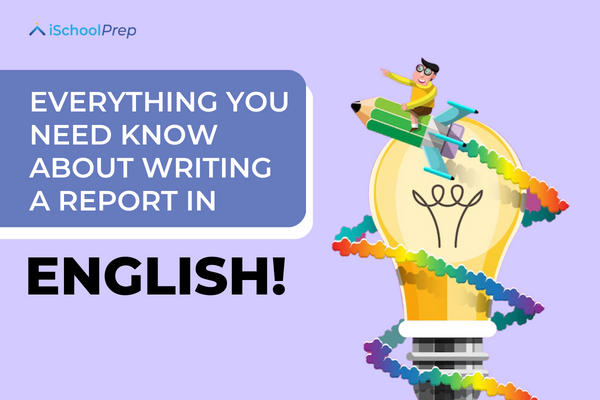Table of Contents
Advice from professionals on report writing in English
If writing a report makes you nervous, consider it an opportunity to practice your writing. If you need help writing a report in English, remember that every report you write will help you learn something new. Therefore, we’ve included a few steps to creating a report and information on report writing below to help you understand what to do.
What should be in a report?
A report is a piece of writing that contains all the factual facts on an event or subject and covers all the relevant information. As a result, the person writing the report must ensure that all the information is supported by appropriate proof. The data that can be added to a report is as follows-
- The event’s basic specifics
- Effects and consequences of the incident
- Analytical and statistical evaluation
- Interpretations based on the data
- Relevance of the data to other occurrences
Even though there are obvious distinctions between report writing and essay writing, there is frequently a lot of uncertainty in this area. Reports stick to the facts, while essays include the author’s opinion. Both types of writing are based on factual information. The fact that their interpretations are unbiased is the only distinction.

Let’s discuss the report writing structure
A professional report needs to grab the reader’s attention right away. A report’s readership is increased when the information is interesting and clear. The report type and the assignment’s specifications define the format. Although each report may have its unique format, the majority have the following general structure-
A perfect summation
Similar to an abstract in an academic paper, an executive summary is a standalone part that highlights the findings in your report so readers know what to expect. In contrast to academic reports, these are more typically utilized for official reports.
Introduction
Before moving on to your findings, your introduction should give any background information necessary to comprehend the overall issue you will discuss in the report’s body. Your thesis statement should be included in it as well.
Body
Your significant findings are explained in the report’s body, divided into headings and subheadings. Most of the report is made up of the body; in contrast to the introduction and conclusion, which are a few paragraphs long, the body can span many pages.
Conclusion
In conclusion, you should synthesize all the information in your report and arrive at a final interpretation or conclusion. Usually, the author inserts their conclusions or speculations here.
Tips for perfect report writing
Writing reports is a crucial skill for many professions and academic programs. It is crucial to take into account the following report writing advice for the best results-
Making a plan before writing
Decide on a report format. What classification framework will you use for the information you already have? How should the headings and subheadings for these parts be organized? Write down your ideas on paper, then group them to form your framework by dividing them into parts and headers.
Adopt a basic design
Improve the legibility and aesthetic appeal of your report. Use headers and subheadings to segment the content into sections. Remember to number these periodically.
Edit and spell-check
A list of questions you should ask yourself before submitting your report is provided below-
- Is it clear, concise, and simple to read? Is it free of grammar errors?
- Do the sections make sense when they’re read in order?
- Is each claim backed up by facts or evidence?
- Are the advice and conclusions believable?
- Are all of the sources properly cited?
Use a bulleted list
When you need to record several related pieces of information, use bullet points as your format. It will make it easier for the reader to comprehend the information.
Make a draft of a report
Before being accepted, the majority of the writing is edited several times. It’s a great opportunity to view anything you might have otherwise missed.
Sentences’ length and simplicity
Long phrases with several sub clauses should be avoided because your reader will need clarification. Ensure that you keep sentences between 15 and 20 words.
Peer review and endorsement
Professional proofreading is beneficial once your report is finished.
Key takeaways
- A report is written more organized and methodically, with headings, subheadings, and other features that make it easier for readers to read.
- The right wording must be used when drafting reports. By increasing your vocabulary, you’ll be better able to make word choices that elevate your writing.
- The report’s conclusion includes the author’s perspective on the subject.
- Read the assignment brief carefully and refer to it while writing a report for a university course to ensure that everything you write and add is pertinent.
If you still feel stuck, iSchool Prep can help you create and develop your ideas into well-written reports. Prepare with us!
Like the blog? Read about IELTS report writing!
FAQs
Question 1: What is a report, exactly?
Answer: A report is a form of writing that pens down certain occurrences, findings, or issues that have happened in a physical sense.
Question 2: What is a report’s purpose, exactly?
Answer: The goal of reports is to disseminate brief information about an event, issue, or idea. For instance, a news report is prepared to inform the public of a story.
Question 3: What is a strong concluding statement?
Answer: The primary idea of the paragraph should be summarised in the concluding sentence without utilizing the same words twice.






